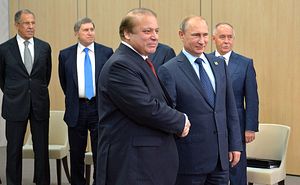A contingent of Russian troops landed in Pakistan on September 23, dispelling rumors that Moscow had decided to cancel its first ever joint military exercises with Pakistan in order to express solidarity with its long time ally India for the Uri attack, which killed 18 Indian soldiers last week in Jammu and Kashmir.
Russia is one of India’s oldest and closest allies. The two countries have pursued broad military and commercial ties since the partition of the subcontinent in 1947. During the Cold War, India signed a treaty of friendship with the Soviet Union in 1971.
Historically, Pakistan and Russia’s ties have remained strained. Until recently, the relationship between the two countries was shaped by Moscow’s ties with New Delhi. However, Russia’s hesitancy to support its historic ally in the wake of the Uri attack by not calling off the exercises with Pakistan marks a distinct shift in Moscow’s foreign policy.
Over the last couple of years, Russia has attempted to expand its relationship with Pakistan. Pakistan and Russia are in the process of finalizing a military deal that includes the sale of Su-35 fighter jets. Moreover, last year, Russia and Pakistan signed an agreement for the construction of an 1,100 kilometer gas pipeline from Lahore to Karachi.
However, Russia’s attempt to engage Pakistan is not a reaction to New Delhi’s much-discussed growing closeness with the United States. Rather, for Russia, it’s an attempt to break out of its growing economic and diplomatic isolation, which surged in the form of Western sanctions aimed at isolating the Russian economy after it annexed Crimea.
Moscow’s decision of not canceling the ongoing military exercises with Pakistan is likely driven by its domestic consideration that the new geostrategic environment in South Asia demands Russia extend its diplomatic, security, and economic outreach beyond its historic partnerships and alliances.
Moreover, Russia is trying to find new markets for its arms in order to keep its defense industry afloat. Russia cannot afford to continue its current dependency on India and China (Russia’s largest arms buyers); the growing economic stagnation of the country will aggravate further if Moscow fails to diversity its arms trade.
India, meanwhile, is diversifying its economic and security relations. Russia, whose ties with China have historically been difficult, is deepening its military and economic relations there as well.
Meanwhile, to fulfill its own growing economic and security needs, Pakistan has looked for other sources of support beyond Washington. Arguably, Islamabad’s strategic tilt away from Washington and toward Beijing is meant to counter the United States’ highly demanding partnership.
In the short term, Russia’s rapprochement with Pakistan will surely annoy India, for it does not fall in line with Indian Prime Minister Narendra Modi’s new policy aimed at isolating Pakistan globally.
Keep in mind that the joint military exercises between Russia and Pakistan were planned months ago. However, Russia’s decision to send troops to Pakistan in the wake of the Uri attack, which India squarely blames on Pakistan, would not have been undertaken without due considerations.
However, none of this means that Moscow will not support New Delhi’s stance on terrorism vis-à-vis Pakistan. While many countries’ condemnation of the Uri attack was veiled, Russia, in its statement, directly mentioned Pakistan: “We note with concern the resurgence of terrorist attacks near the Line of Control. It is alarming and according to New Dehli, the attack on military unit near the town of Uri was committed from the territory of Pakistan.”
Moreover, the Russian embassy in India, in a statement, said that the counterterrorism exercises will not be held in any disputed areas, such as Gilgit-Baltistan, or the Pakistan-controlled part of the Kashmir region. (There was some confusion regarding this statement as the exercise was slated to start in Rattu in Gilgit-Baltistan, according to Pakistani reports.)
Without a doubt, the changing phase of Russia-Pakistan relations does not pose any real challenge to New Delhi’s time-tested strategic partnership with Moscow. Nevertheless, these developments do indicate that Moscow and Islamabad’s bilateral relations will no longer be defined by India-Russia ties.

































